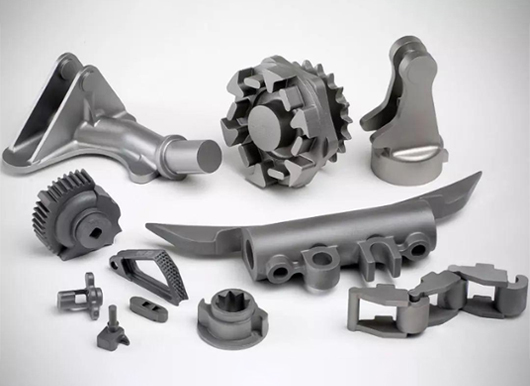The Ultimate Guide To Alcast Company
The Ultimate Guide To Alcast Company
Blog Article
Some Of Alcast Company
Table of ContentsA Biased View of Alcast CompanyThe Definitive Guide to Alcast CompanyAbout Alcast CompanyExcitement About Alcast CompanyNot known Facts About Alcast CompanyThe Definitive Guide to Alcast Company
The subtle distinction depends on the chemical content. Chemical Contrast of Cast Light weight aluminum Alloys Silicon promotes castability by lowering the alloy's melting temperature and enhancing fluidness during spreading. It plays an essential function in allowing complex mold and mildews to be filled up properly. Furthermore, silicon adds to the alloy's toughness and put on resistance, making it beneficial in applications where toughness is critical, such as vehicle components and engine parts.It likewise enhances the machinability of the alloy, making it easier to refine right into completed products. This way, iron contributes to the general workability of aluminum alloys. Copper raises electric conductivity, making it advantageous in electric applications. It also improves corrosion resistance and adds to the alloy's overall strength.
Manganese adds to the strength of light weight aluminum alloys and improves workability (Foundry). It is commonly made use of in functioned aluminum products like sheets, extrusions, and accounts. The presence of manganese help in the alloy's formability and resistance to cracking during manufacture processes. Magnesium is a lightweight component that supplies stamina and influence resistance to aluminum alloys.
The Ultimate Guide To Alcast Company
Zinc improves the castability of light weight aluminum alloys and helps regulate the solidification procedure during spreading. It boosts the alloy's strength and firmness.

The main thermal conductivity, tensile stamina, return strength, and prolongation differ. Select suitable resources according to the efficiency of the target product generated. Among the above alloys, A356 has the highest thermal conductivity, and A380 and ADC12 have the lowest. The tensile limitation is the opposite. A360 has the very best yield toughness and the greatest elongation rate.
See This Report on Alcast Company

In accuracy spreading, 6063 is fit for applications where intricate geometries and premium surface area coatings are vital. Examples consist of telecommunication enclosures, where the alloy's remarkable formability enables streamlined and cosmetically pleasing styles while maintaining architectural honesty. In the Lighting Solutions sector, precision-cast 6063 parts produce sophisticated and efficient lighting fixtures that need intricate shapes and good thermal efficiency.
It brings about a better surface area coating and much better corrosion resistance in A360. The A360 exhibits remarkable prolongation, making it optimal for facility and thin-walled components. In precision spreading applications, A360 is well-suited for markets such as Consumer Electronic Devices, Telecommunication, and Power Tools. Its enhanced fluidness enables elaborate, high-precision components like smart device coverings and interaction device real estates.
Fascination About Alcast Company
Its unique residential or commercial properties make A360 a valuable selection for precision casting in these sectors, improving item durability and top quality. Aluminum alloy 380, or A380, is find this an extensively made use of spreading alloy with a number of unique attributes. It uses excellent castability, making it an ideal option for precision spreading. A380 shows excellent fluidness when molten, guaranteeing complex and in-depth mold and mildews are precisely recreated.
In precision casting, light weight aluminum 413 shines in the Consumer Electronic Devices and Power Tools industries. It's typically used to craft complex components like smartphone housings, camera bodies, and power tool coverings. Its accuracy is impressive, with tight tolerances approximately 0.01 mm, ensuring flawless item assembly. This alloy's premium corrosion resistance makes it an excellent choice for exterior applications, ensuring resilient, long lasting items in the stated markets.
Alcast Company Things To Know Before You Buy
The aluminum alloy you choose will substantially affect both the casting procedure and the properties of the final item. Since of this, you should make your choice meticulously and take an educated method.
Figuring out the most suitable light weight aluminum alloy for your application will certainly indicate weighing a large array of qualities. The very first category addresses alloy attributes that affect the manufacturing process.
Our Alcast Company PDFs
The alloy you pick for die casting straight impacts numerous facets of the spreading procedure, like just how very easy the alloy is to work with and if it is susceptible to casting problems. Warm fracturing, additionally referred to as solidification breaking, is a normal die casting issue for light weight aluminum alloys that can result in inner or surface-level splits or splits.
Specific light weight aluminum alloys are more susceptible to hot breaking than others, and your option ought to consider this. One more usual issue located in the die casting of aluminum is die soldering, which is when the actors sticks to the die wall surfaces and makes ejection difficult. It can damage both the cast and the die, so you ought to look for alloys with high anti-soldering residential properties.
Deterioration resistance, which is already a notable quality of aluminum, can vary significantly from alloy to alloy and is a crucial characteristic to take into consideration depending on the ecological conditions your product will certainly be exposed to (aluminum foundry). Put on resistance is one more building typically sought in light weight aluminum items and can separate some alloys
Report this page